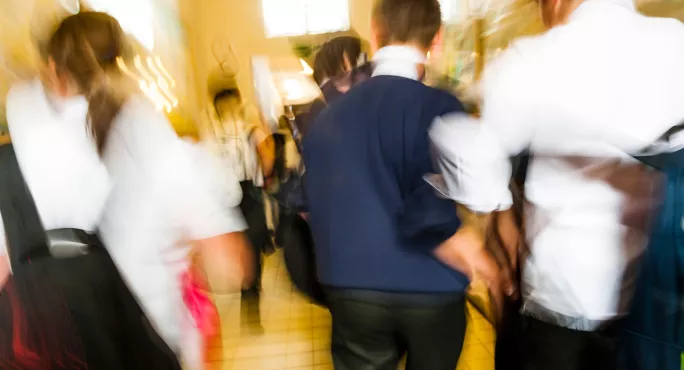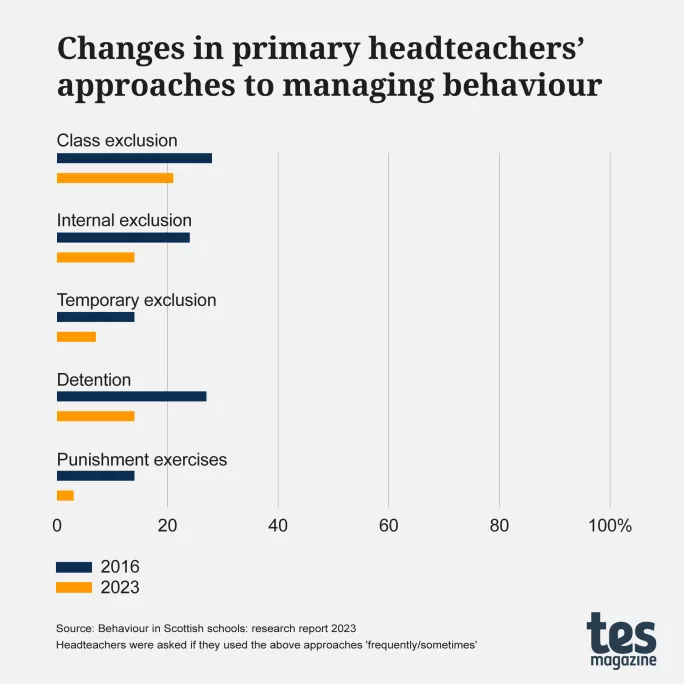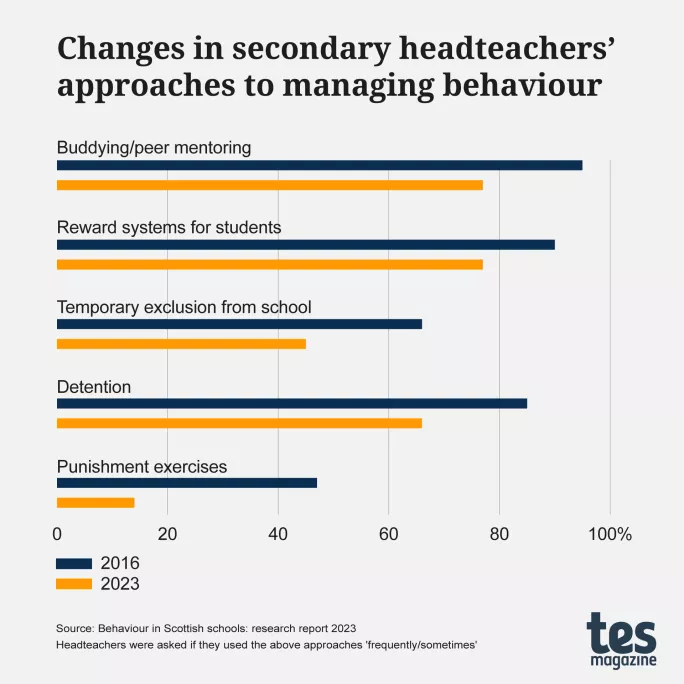
Could banning mobiles ease Scottish schools’ behaviour woes?

This year Shelley McLaren, the headteacher of Craigroyston Community High in Edinburgh, banned mobile phones in S1.
She did it because mobiles were a constant source of conflict between teachers and students.
The students would get their phones out in class, the teacher would tell them to put the phone away, and this would be repeated ad nauseam in lesson after lesson, day after day.
The other big motivator, says McLaren, was to reduce the damage students do to each other on social media. The online bullying and the inappropriate filming that spills into the classroom, poisons relationships, causes huge amounts of heartache and takes endless hours of staff time to resolve.
“I realised if we took away mobile phones, we got rid of all of that, so we did and it has been amazing,” she says.
- Background: Serious disruptive behaviour rising in Scottish schools
- Related: Gilruth’s 5-point plan to tackle behaviour
- Headteacher view: Balance and boundaries are key to behaviour
- Long read: What’s behind Scotland’s ‘behaviour emergency’?
S1 students at Craigroyston check in their phones at the start of the day and check them out when they leave in the afternoon. Sometimes there is a queue at the end of the day but, actually, the change means fewer students bring their phones in the first place.
The Behaviour in Scottish Schools Research (BISSR) published this week finds there has been “a general deterioration in the behaviour of pupils in primary and secondary schools in Scotland since 2016”.
In secondary schools, the behaviour most commonly reported as having the greatest negative impact on the learning experience was students using and looking at mobile phones and tablets when they shouldn’t be.
The results from primary stood in stark contrast. Using and looking at mobile phones and tablets was only mentioned by just 1 per cent of primary school staff.
The report says this is “likely due to household and school rules around primary school-aged children’s access to technology” - prompting questions in the Scottish Parliament yesterday about whether restricting mobile phone use in school is “vital if we are serious about tackling behaviour problems”.
Restricting mobiles in schools
In response to Conservative MSP Sue Webber - who was posing this question - education secretary Jenny Gilruth said it was “an important point” but added it was “for individual headteachers” to make these decisions.
Is it conceivable, though, that these decision would be easier for headteachers to take if the government made its position clear?
After all, the BISSR is not the only report in recent times to suggest pupils having access to mobile phones in school is detrimental to their learning.
Unesco’s 2023 Global Education Monitoring Report - Technology in education: A tool on whose terms?, published in July - called for a ban on smartphones in class. It said technology should only be used in school “when it supports learning outcomes” and that “mere proximity to a mobile device was found to distract students and to have a negative impact on learning”.
Plan to tackle behaviour
This week, Ms Gilruth set out her five-point plan for tackling challenging behaviour - making only a cursory mention of “disruptive use of mobile phones” - and provoked the ire of many in the profession.
The £900,000 for councils to invest in staff training would not “touch the sides”, said the EIS teaching union. The union’s general secretary, Andrea Bradley, called for “additional teachers and support for teachers”.
The NASUWT teaching union described the statement as “a missed opportunity” to “improve the systems that should be in place to support and protect teachers and other school staff”.
Meanwhile, teachers commenting on social media felt cash for more training implied they were to blame for increasing levels of disruption in school.
The BISSR shows what school staff actually want is more “time and support” to integrate “nurturing and restorative approaches to managing discipline”.
They also want “meaningful consequences within this approach for more serious disruptive behaviour”, the research finds. It shows how punitive approaches to behaviour management have decreased over time.


There is great debate about whether this has been for the better, or for the worse. But the research shows school staff are “generally supportive of more nurturing and restorative approaches to managing discipline”.
It is the government that has presided over this “culture shift in terms of how pupil behaviour is understood”; it has set Scotland on this course.
It is, therefore, disingenuous for Ms Gilruth to now paint herself as powerless.
Councils do indeed run schools - as she so often points out - but the government sets the tone and the direction of travel.
The underlying causes of deteriorating behaviour in Scottish schools are undoubtedly complex but that does not mean there are no quick wins or space for bold decisions - just ask the staff at Craigroyston.
Emma Seith is senior reporter at Tes Scotland. She tweets @Emma_Seith
You need a Tes subscription to read this article
Subscribe now to read this article and get other subscriber-only content:
- Unlimited access to all Tes magazine content
- Exclusive subscriber-only stories
- Award-winning email newsletters
- Unlimited access to all Tes magazine content
- Exclusive subscriber-only stories
- Award-winning email newsletters
You need a subscription to read this article
Subscribe now to read this article and get other subscriber-only content, including:
- Unlimited access to all Tes magazine content
- Exclusive subscriber-only stories
- Award-winning email newsletters
- Unlimited access to all Tes magazine content
- Exclusive subscriber-only stories
- Award-winning email newsletters



